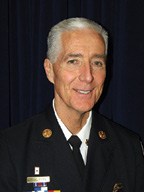
The leadership in any organization has a life span that is sometimes predictable and sometimes not so much. The “chief’s” life span will ebb and flow with the fortunes of the times. Leadership in the fire service, particularly in municipal departments, is forever changing as elected officials come into office and customarily replace department heads. These well-meaning bureaucrats often have the best of intentions and feel they need to have the loyalty and fidelity of these department heads to ensure that the vision they have for Hooterville will be uniformly dispersed throughout every department in the community.
The selection process for the chief’s position can be complex and exhaustive, including an intense, highly structured national search and very complicated elimination process. Or, simply, the new mayor can appoint a good guy/gal who raised a bunch of money or was the former union president who rallied the troops behind “Mayor Right.”
The United States Armed forces is slightly different.
(a) General Rule
Unless retired or separated earlier, each regular commissioned officer of the Army, Navy, Air Force, or Marine Corps serving in a general or flag officer grade shall be retired on the first day of the month following the month in which the officer becomes 64 years of age.
(b) Exception for Officers Serving in O-9 and O-10 Positions. In the case of an officer serving in a position that carries a grade above major general or rear admiral, the retirement under subsection (a) of that officer may be deferred—
(1) by the President, but such a deferment may not extend beyond the first day of the month following the month in which the officer becomes 68 years of age; or
(2) by the Secretary of Defense, but such a deferment may not extend beyond the first day of the month following the month in which the officer becomes 66 years of age.
Many of our cities and towns have age limits for serving in the fire department, and that is neither good nor bad. Often, big chiefs’ “flag officers” are exempted. The justification is generally that they are indispensable and the functions they serve are not front line or forward, as we say, and thereby their physical limitations of age are less significant than the knowledge, wisdom, and experience they contribute to the department. This is a very valid and well-reasoned thought and, depending on your situation, position, and age, you may or may not agree with it.
But everything and every purpose has a season, a life span, and regardless of how the inevitable change of command is prompted to occur, it will. How we attend to it matters; how we prepare the organization for new command and a new leader or leaders is important. The command of any organization is continually questioned, critiqued, disparaged, and often spoken of in terms far less flattering than one would share if they were present.
Even the most beloved fire chiefs have had detractors, were maligned, and were attributed rumors and words that were never theirs. Motives and intentions that were scurrilous have been sourced to them by their closest friends, command staff, and confidants. This is just reality, human nature; we gossip, we get our feelings hurt, and we lash out. We trespass, and others trespass against us. This is not news to anyone who is older than six. But that does not make it any less painful to be the one injured or trespassed against. Solace should come from that when you did it, someone forgave you. You, in turn, should forgive and move on.
That letting go, forgiving, is not always a straightforward process. Weeks, months, even years after “old lead bottom” has moved on, we still are stinging from the dressing down he gave us on scene or from the unjust demotion, suspension, passover, insult, slight, or dumb rule he imposed on us. As the old adage goes, “Friends come and go, but enemies accumulate.” When the refrigerator door is left open, food spoils; so we close the door.
To close the door brings healing to all. Closure is an important piece of any relationship, and it does not necessarily mean an ending completely but that the existing construct or structure of the relationship is over, done. A retired flag officer can become a consultant, an advisor. A former deputy chief may be the new assistant chief. The important thing is to formalize the end of the relationship as it currently exists. It is always best if you have some advance warning—the more the better—but, nonetheless, it must be done to ensure organizational and relational health.
Closing the door is done with a formal “Change of Command Ceremony,” rituals and traditions that enable the outgoing to say farewell, introduce the incoming, and leave with dignity. The outgoing chief should have a dinner as close as possible to the last day, with the command staff and appropriate subordinate officers. It should be ritualized, gifts should be exchanged, stories told, lies shared, and lingering animosities laid to rest. This is done with humor and wit; it requires a good master of ceremonies who knows the players, the history, and the backstories.
The “Change of Command Ceremony” is a formal event. All available on-duty and off-duty members should attend. The uniform of the day is formal. The ceremony requires colors and banners posted and a brief introduction from the senior officer. The outgoing chief then addresses the troops and the incoming chief. At the completion, they read their orders. The incoming chief, standing to the right, says, “I relieve you, sir,” and the reply is, “I stand relieved.” The two then report to their superior and, after brief remarks from the new commanding officer, a benediction, and ceremony, the relationship as it was is over.
Good flag officers and good organizations anticipate, prepare, and celebrate our Change of Command.

